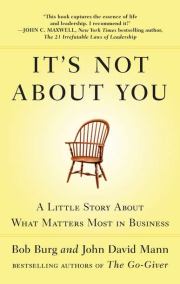 Bob Burg is a long time and valued friend and colleauge. I first met Bob through our membership in the National Speakers Association. He is an excellent communicator, prolific blogger and terrific speaker but one of the things that I most appreciate about him is that he practices what he teaches. Bob is an expert at creating and keeping connections. He has been a long time supporter of my work and has introduced my ideas to those in his network for which I am grateful. He and coauthor John David Mann wrote It’s Not About You, a great little leadership book that I endorsed. The book focuses on what really matters in business and I encouraged you to check it out. I asked Bob to contribute a guest blog and it follows below:
Bob Burg is a long time and valued friend and colleauge. I first met Bob through our membership in the National Speakers Association. He is an excellent communicator, prolific blogger and terrific speaker but one of the things that I most appreciate about him is that he practices what he teaches. Bob is an expert at creating and keeping connections. He has been a long time supporter of my work and has introduced my ideas to those in his network for which I am grateful. He and coauthor John David Mann wrote It’s Not About You, a great little leadership book that I endorsed. The book focuses on what really matters in business and I encouraged you to check it out. I asked Bob to contribute a guest blog and it follows below:
You’ve seen it happen again and again.
A corrupt government is toppled by revolutionary forces, marshaling the will of the people, the dictators fall, happiness reigns once again … but then something weird happens. The revolutionaries start looking a lot like the tyrants they just deposed.
It happens in business, too. A fresh new leader comes along, an innovative startup comes out with something brilliant that mixes up the marketplace, an organization galvanized by someone new at the helm leaps inspired into double-digit growth …
Until a few years later that new leadership starts resisting change, digging in its heels, and acting a lot like the old leadership.
What happened?
There are all sorts of academic insights and lessons visible in the succession of power. But at the root, quite often there is something personal and internal happening here, a process that blunts the edge and sabotages the positive influence of once-great leadership.
It happens to kings, presidents, heads of religious organizations and great corporations, leaders and people of influence in every domain. It can happen to anyone with a following of any size or number.
It is this: after a time, they start getting it backwards.
L E A D becomes D E A L.
As a leader, you become the container of others’ hopes. When we say people put their trust in you, that is not just a figure of speech. People place their hopes and dreams, trust and faith, even their fears, in your hands, because these things feel too fragile, too big, too important, too valuable to hold onto by themselves.
You become the trustee of their intangibles. You hold them, believe in them when they forget how to believe in themselves.
But — and here’s the key to it — you are not their dreams, you are only the steward of those dreams. And leaders too often get it backwards and start thinking they not only hold the best of others, but that they are that best.
After a time of absorbing all that trust and faith, the sense of all those people looking to them for guidance, inspiration and constancy, they confuse the container with the contents.
They start thinking they are the deal.
And the moment you begin thinking that it’s all about you, that you’re the deal, is the moment you begin losing your capacity to positively influence others’ lives.
In a word, to lead.
If you are in a position of influence, here is a simple way to avoid this classic tragedy of leadership: every day, remember what it’s about.
Great parenting is not about the parent. Great teaching is not about the teacher. And great leadership? You’ve already filled in that blank.
Bob Burg and John David Mann are coauthors of the new release It’s Not About You. You can download two sample chapters here.







